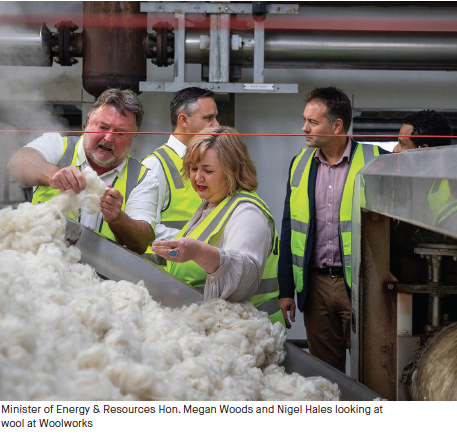Local wool scourer business WoolWorks received more than $4 million in co-funding from GIDI Fund to convert gas and coal boilers at their Awatoto (Napier) and Washdyke (near Timaru) sites to more modern and efficient hot water heat pump technology.
The new hot water pump at Awatoto, which will be one of the most sophisticated and largest in New Zealand, will replace the site’s natural gas-based hot water generation system, including a hot water boiler and steam heat exchangers.
WoolWorks will invest $2 million into the Awatoto project, with EECA (the Energy Efficiency and Conservation Authority) contributing $455,000 through GIDI funding.
WoolWorks, which employs 150 people, is the largest wool scourer by volume in the world and handles 76 percent of all New Zealand wool.
The project will reduce carbon dioxide emissions from scouring operations at the plant by 1,700 net tonnes per year, 24 percent of the total energy-related emissions from the site.
Every year, the company’s three sites wash more than 100,000,000 kilograms of wool, ranging from superfine merino to crossbred. Prior to processing into garments or carpets, wool needs to be cleaned and this is an energy intensive process reliant on coal boilers.
“We were on a path to reduce our dependence on coal but it would probably have been closer to 2030 before we got there,” says WoolWorks chief executive Nigel Hales.
The funding will be used to install an electrode boiler to produce steam and an industrial heat pump to generate hot water, reducing over 11,000 tonnes of carbon dioxide emissions every year, the equivalent of removing 3,021 cars from the road.
Nigel says the company has made significant gains in improving the efficiency of its world-class scour operations, leading the way globally for the total useful energy usage per kilogram of wool and reducing its carbon footprint.
EECA also funded an energy audit for the Awatoto site in 2020. The audit identified many opportunities that could be implemented to reduce energy consumption, and resulted in installing new low carbon technologies for process heat decarbonisation.
WoolWorks actively manages its energy consumption at its sites and through EECA has been able to appoint a process engineering graduate to focus on energy modelling, simulation and sustainable options.
Other energy efficiency initiatives at Awatoto include the insulation of high-temperature surfaces, including steam and condensate piping and modifying flow-down systems to maximise heat recovery. Every part of the scouring process is monitored, with water usage carefully controlled and waste streams recycled and re-used where possible.
“We will provide the New Zealand wool sector with a unique low-carbon start to the global supply chain, which will support increased demand for New Zealand wool. Rather than planting our way out of the climate change problem by purchasing pine trees to offset our greenhouse gas emissions, we are choosing to do the right thing by the environment and actually reduce our emissions,” says Nigel.



